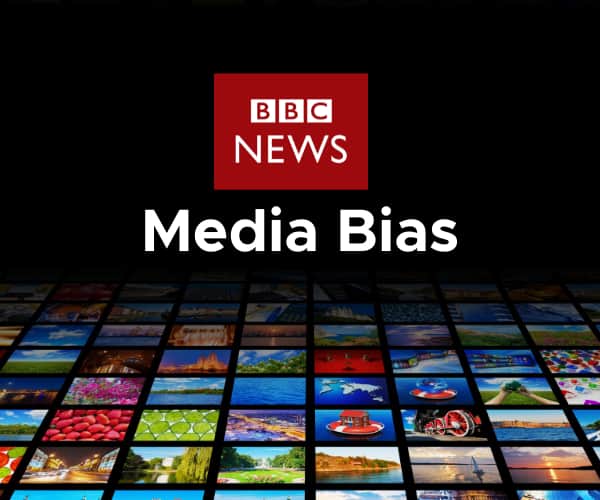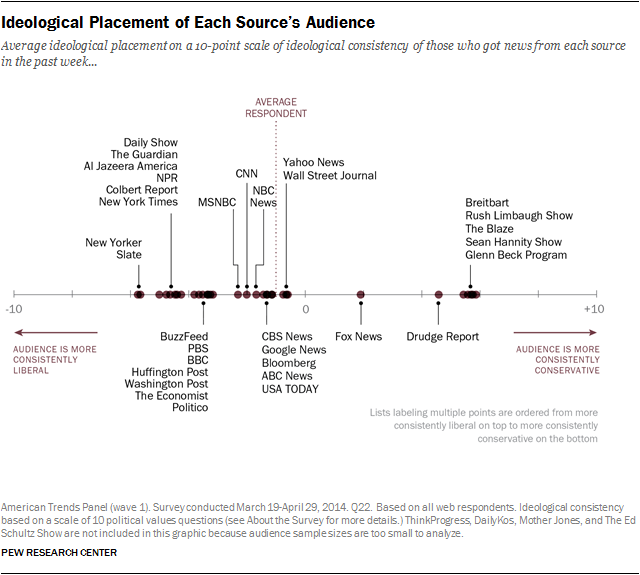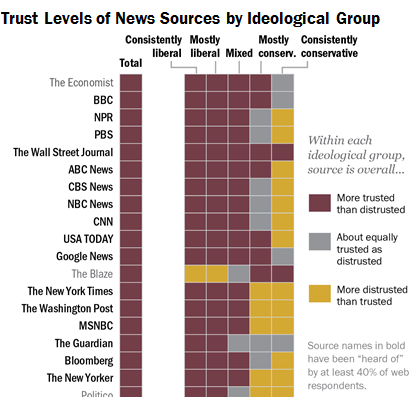
Praised by many for being one of the top-discussed news broadcasting companies in the decades since its founding, the British Broadcasting Company has had a vast history of providing news broadcasts in radio, online media, and various television segments. The BBC is the first national broadcasting organization, which has allowed them to cover a majority of topics throughout its inception, despite being created in 1922 within the United Kingdom, it has been able to reach many corners of the world with its journalism. As stated within its website, the BBC recites its mission statement in the following words, “Our mission is “to act in the public interest, serving all audiences through the provision of impartial, high-quality and distinctive output and services which inform, educate and entertain.”” With this idea in mind, it can now be assessed whether the BBC has successfully achieved its goal of remaining impartial.
How Does Biasly Rate News Sources?
Biasly’s algorithms produce bias ratings to help provide multiple perspectives on given articles. Biasly has analyzed 200,000+ news articles from more than 3,200 news sources through our A.I. technology and team of political analysts to find the most factual, unbiased news stories.
Biasly determines the degree of political bias in news sources by using Biasly’s Bias Meter Rating, in which Biasly’s team analyzes media sources’ reliability and bias and produces three scores, a Reliability Score that measures the accuracy of media sources; an A.I. Bias Score, evaluated by A.I.; and an Analyst Bias Score evaluated by political analysts. These scores are rated based on seven rating metrics including Tone, Tendency, Diction, Author Check, Selection/Omission, Expediency Bias, and Accuracy. These metrics help our analysts to determine the political attitude of the article.
Our A.I. machine-learning system employs natural language processing and entity-specific sentiment analysis to examine individual articles and determine their bias levels. By analyzing the key terms in an article such as policies, bias phrases, political terminologies, politicians, and their nicknames, the algorithms can rate the attitude of the text. Bias scores range from -100% and 100%, with higher negative scores being more liberal and higher positive scores being more conservative, and 0% being neutral.
Does The BBC Have Biased News Coverage?
Due to the BBC having a long track record of reporting news, it has been praised due to its relatively unbiased news reporting. In accordance with Biasly’s A.I. Bias Score, the BBC received a Center to Center-left leaning rating, meaning that it was scored as relatively unbiased by the A.I. technology. However, it received a Somewhat Liberal-leaning rating by the Analysts Bias Score. This was decided after a thorough look at their patterns with news reporting, statements, accounts, and online statements made by any part of the company’s team.
Being thought of as Right-leaning by Leftists and Left-leaning by Rightists, this shows that the BBC is not afraid to show more balanced and center-leaning content and insights from both perspectives. Throughout their trajectory, they have been able to present many events accurately with the facts and are regarded as doing well-researched news coverage.

(Graph will be inserted here and demonstrate a somewhat Left-Leaning audience following BBC. Source: Pew Research Group)
Note: While Center-leaning news sources tend to offer more in-depth factual research and reporting, a Left-leaning or Right-leaning news source can still provide insightful knowledge despite moderate bias. As long as these news sources are able to differentiate between their opinions as journalists and the strict facts, it can provide a look into the minds of those that have other opinions surrounding an event that occurred. Center-leaning news sources are better able to offer the reader or viewer a chance to interpret the news for themselves, but these can also be used in conjunction with other perspectives.

(Graph inserted here showing that across the board, Liberals, Left-leaning, Center, and Right-leaning people trust BBC with the only group distrusting being Consistently Conservatives. Source: Pew Research Group)
Since this blog post will take a look at the BBC’s presence as a news broadcasting source through their articles published online, it will not cover their various television channels or their radio broadcasts. With the use of Biasly’s A.I. bias-detecting technology and Bias Analysts, articles will be dissected and inspected in the next section to figure out if the BBC is truly a relatively impartial news source.
Before we begin, we need to discuss bias. Bias is a natural function of humans, and we can express it both consciously and unconsciously. Bias is one of the most fundamental forms of pattern recognition in humans. This isn’t to lower the bar and say that “all things are biased,” but to explain the process in which we may come to trust certain news organizations that display patterns of coverage.
On the media’s part, there is an incentive to retain audiences, encourage them to purchase subscriptions, and rate products positively. Bias is a two-way street, people want to see news stories about things they care about, and the media needs viewers to continue their operations. This creates a positive feedback loop that influences what stories are covered and from what perspective. This also explains the actions of more liberal news organizations.
Analyzing Bias in the BBC’s Online Articles
With the BBC keeping track of various world events that impact people all over the world, it has also kept track of various issues that are in the eye of the media within the United States. One of these examples is the current debate surrounding abortion rights, the complex relationship between church and state, and Joe Biden’s presidency as it relates to these topics.
Following the news, the BBC published an article written by Anthony Zurcher, which will serve as an example of the assessment of bias that the BBC may hold. This article, titled “Abortion rights: US Catholic bishops face a clash with Biden,” received a Liberal-leaning rating and an excellent reliable accuracy score. This A.I. Bias Score has been given to the article based on a mixture of tone within the article, the author’s leanings, and diction towards policies, politicians, and other political terms. As an example, the following can be used to inspect the author’s leanings in the article:
“… the decision to consider punishing perhaps the best-known American Catholic – a man who attends Mass weekly and regularly speaks of his faith – comes with considerable risk.”
The author, Anthony Zurcher, offers his insight toward the end of the article and uses the phrases “best-known Catholic” and phrases that put President Biden as a man of deep faith, who has somehow proven he is a devout Catholic. According to Biasly’s Author Bias, Zurcher scores a Liberal-Leaning score. This means he tends to favor the Left in his political opinions, however, the Excellent Reliability Score also means that this does not discredit his views.
Despite his point of view towards the end of the article, the rest of the article remains fairly impartial in its demonstration of the events that have occurred between the Vatican and President Biden. It is careful to mention the long, and complex, relationship between the two without inserting their own opinions. They allow each other’s statements against the other side to speak for themselves and simply act as a deliverer of the news, making sure to show that those words are from specific people they discussed and not BBC. Additionally, this shows that news-reporting companies are able to relay the facts and simultaneously allow the viewers to see their own opinions, without taking away from the impartial news.
Who Owns the BBC?
Being a public corporation, the BBC is neither controlled by the government nor controlled by the state. U.K. households fund the BBC through a compulsory television fee, regardless if they watch it or not. Under the Royal Charter that the BBC was created, this impedes the government from getting involved in how news is delivered. Additionally, this guideline for the BBC also reinforces the idea that all perspectives must receive balanced coverage and impartial broadcasting.
How Opinionated is the BBC?
Priding itself on delivering impartial news coverage, the BBC has received criticisms about not always being balanced. In a statement, BBC Chairman, Richard Sharp, acknowledged these Left-leaning biases and concerns from the public and vowed to resolve them. Despite this, the general public remains fairly confident in the BBC’s ability to give ample screen time to all narratives. Additionally, being slightly leaning towards a side does not negate the fact that the BBC has been generally impartial in its news coverage.
How To Detect Bias
It can often be difficult to tell if the news you watch is biased. If you have settled on a news channel, it’s usually because you trust the information you are gaining. Unfortunately, many trust the information they are hearing because it confirms what they already believe. This is referred to as “confirmation bias.” It is important to challenge your beliefs and get third-party verification that what you are hearing is the full story. This is why we recommend using Biasly to compare different news stories side-by-side using our bias ratings to figure out what both sides think of a political issue.
Disclaimer: Pew Research Center bears no responsibility for the analyses or interpretations of the data presented here. The opinions expressed herein, including any implications for policy, are those of the author and not of Pew Research Center.




























